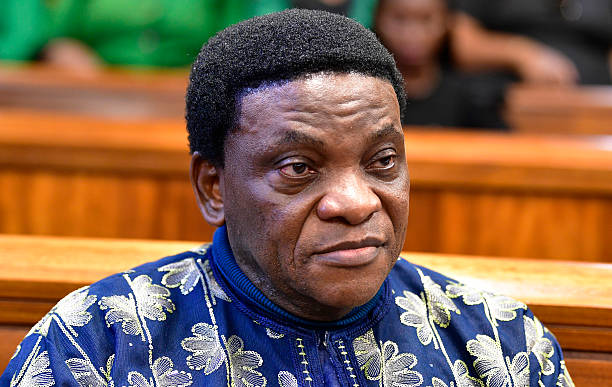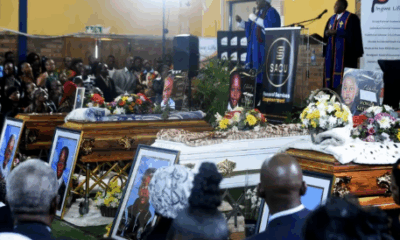News
NPA Fights Back: Inside the Next Chapter of the Timothy Omotoso Case

NPA Fights Back: Inside the Next Chapter of the Timothy Omotoso Case
Eight years, three accused, dozens of alleged victims and still, the story isn’t over.
The National Prosecuting Authority (NPA) is making one last push to keep the long-running Timothy Omotoso case alive. Months after the Nigerian-born televangelist and two of his co-accused were acquitted on charges of rape, human trafficking, and sexual assault, the State is now seeking leave to appeal the ruling that set them free.
This week, the Eastern Cape High Court in Gqeberha heard arguments from State Advocate Apla Bodlani, who wants key questions of law reserved for the Supreme Court of Appeal (SCA). The move, if successful, could reopen one of South Africa’s most controversial and emotionally charged trials.
A Case That Refuses to Die
Back in April, Omotoso and his alleged recruiters, Lusanda Sulani and Zikiswa Sitho, were acquitted on more than 30 charges. It was a dramatic collapse for a case that once included 63 counts of rape, trafficking for sexual purposes, and racketeering.
At the time, Judge Irma Schoeman ruled that serious procedural failures in the prosecution had rendered the case untenable. She criticised the State’s cross-examination of Omotoso as “poor quality” and said the prosecutors had failed to challenge the accused’s version of events effectively. Without that, she said, the accused’s testimony stood, leading to the eventual acquittal.
That decision sent shockwaves across South Africa. For many, especially the women who came forward, it felt like justice had slipped through the cracks of courtroom procedure.
The State’s Second Wind
Now, the NPA wants the Supreme Court of Appeal to decide whether Judge Schoeman applied the law correctly.
In their heads of argument, the prosecution insists this isn’t about emotion or public outrage it’s about legal principle. Deputy Director of Public Prosecutions Joel Cesar argued that Schoeman “erred in law” when she found the trio not guilty of all 32 remaining charges.
According to Cesar, another court might reasonably find that the judge placed too much weight on the technical flaws in the trial and too little on the actual evidence of the complainants.
As Bodlani told the court: “All that this Court has to decide is whether the questions sought to be reserved by the State are questions of law.”
The Defence Stands Firm
Omotoso’s long-time lawyer, Peter Dauberman, isn’t buying it. He argues that the NPA’s application is an attempt to “repackage factual disputes as legal errors.”
In his view, even if Schoeman made a mistake, it wouldn’t have changed the outcome. “The alleged error, even if established, could not have affected the verdict,” Dauberman said, calling the State’s move “academic.”
He maintains that the State’s so-called questions of law are really just disagreements with how the evidence was interpreted, something that cannot be appealed on a legal basis.
Eight Years of Turmoil
Since Omotoso’s 2017 arrest, the case has been a slow-motion saga of delays, mistrial applications, and Constitutional Court challenges. The defence filed multiple interlocutory applications, while witnesses withdrew over time, many saying they no longer wanted to relive their trauma in court.
According to NPA spokesperson Luxolo Tyali, these setbacks gutted the case. “Some witnesses no longer wanted to proceed. They’ve moved on with their lives,” he said. Even so, Tyali insists the prosecution “remains steadfast” and will “go to all lengths to give a voice to the victims.”
The NPA’s resolve now hinges on whether the appeal is granted, a decision Judge Schoeman has reserved for a later date.
Omotoso’s Exit and What Comes Next
After his acquittal, Timothy Omotoso left South Africa for Nigeria, where he continues to preach. His departure followed a Home Affairs decision confirming his status as a prohibited person under South African immigration law.
That exit, while legal, left a bitter taste for many South Africans who had followed the case closely. Social media platforms lit up with frustration, with one user posting on X:
“After eight years, how do we explain to victims that procedure mattered more than their pain?”
Another wrote:
“Justice must not only be done, it must be seen to be done. Right now, it’s invisible.”
Whether the NPA succeeds in its appeal or not, the Omotoso saga exposes something deeper about the South African justice system: how prolonged trials and procedural missteps can derail even the most serious of cases.
It’s also a test of faith, not in religion, but in justice itself. For the victims, the State’s renewed effort represents one last hope that their voices won’t be lost in legal paperwork.
As the country waits for Judge Schoeman’s decision, one thing is clear: this case is far from over. And for South Africans watching from the sidelines, it’s another reminder that in the fight for justice, the courtroom can be as unpredictable as the crime itself.
{Source: The Citizen}
Follow Joburg ETC on Facebook, Twitter , TikTok and Instagram
For more News in Johannesburg, visit joburgetc.com



























